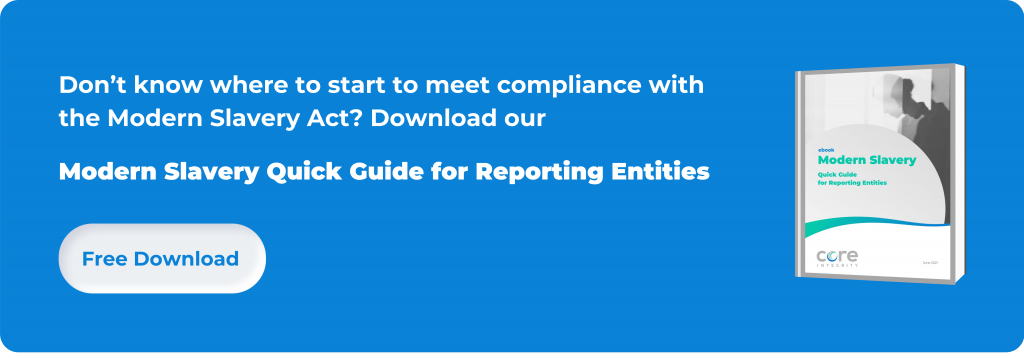The Modern Slavery Act requires Reporting Entities to implement a framework and submit a Modern Slavery statement. Learn more about how Modern Slavery affects Organisations in Australia and your organisation’s obligations under the act in this blog article.
What is Modern Slavery?
For many Australians, the concept of slavery is something defined to the past or, at the very least, a practice that takes place in third-world countries. Although the latter is a true statement, the reality is that slavery is not extinct in Australia.
Statistics from the Australian Institute of Criminology estimated that the number of human trafficking and slavery victims in Australia in 2016 – 2017 was between 1,300 and 1,900.
Looking broader than just Australia, the International Labour Organisation has estimated that there are currently over 40 million people globally who are experiencing some form of slavery. This contemporary or ‘modern’ form of slavery can include:
- Forced labour;
- Debt bondage;
- Human trafficking;
- Child slavery;
- Forced and/or early marriage;
- Descent based slavery; and
- Deceptive recruiting for labour
How does Modern Slavery impact Australia?
Australia’s exposure to modern slavery is not only limited to the victims of slavery who are currently living in Australia. As a nation, we also have international obligations to eliminate slavery and many businesses may be connected (albeit ignorantly) to modern slavery practices because of global trade and supply lines.
This connection to modern slavery through global trade and supply chains can exist through associations to suppliers, manufacturers and distributors who operate outside of (and sometimes in) Australia and are engaged in modern slavery practices.
The Legislative Framework around Modern Slavery
In 2011, the United Nations published the ‘Guiding Principles on Business and Human Rights’.
The Guiding Principles are founded on three pillars:
- The State’s duty to protect human rights abuse by third parties, including businesses, through appropriate policies, legislation, regulations, and adjudication;
- The responsibility of businesses to not to contribute to abuses of human rights through business operations and supply chains; and
- The need for greater access to effective remedies for victims of business-related human rights abuse.
On 1 January 2019, and as part of its commitment to eliminate modern slavery, the Australian Federal Government enacted the Modern Slavery Act 2018 (the Act).
Within the Act, eight distinct types of slavery are included in the definition of ‘modern slavery’. These are:
- Trafficking in Persons
- Slavery
- Servitude
- Forced Labour
- Forced Marriage
- Debt Bondage
- The worst forms of child labour
- Deceptive Recruiting for labour or service
The Act requires a “Reporting Entity” to produce a Modern Slavery Statement and submit this statement to the Australian Border Force (ABF). The ABF maintains a public register of statements which is available online.
The Act defines a Reporting Entity as a business that has a consolidated revenue of at least $100 million for the reporting period and is either:
- An Australian entity at any time in the reporting period; or
- A foreign entity carrying on business in Australia at any time in the reporting period.
Additionally, all organisations and businesses can volunteer to become a Reporting Entity under the Act. Any business, irrespective of whether it is bound by the Act, should consider implementing a Modern Slavery Statement and Framework to ensure that it is doing its part to not only eradicate modern slavery, but also protect its own reputation that may be adversely impacted by being associated – through supply chains and operations – with an organisation that practices modern slavery.
What are the steps organisations must take to be compliant with the Act?
The requirements of the Act are simple: if you fit the definition of a Reporting Entity (or volunteer to be a Reporting Entity), you need to submit a Modern Slavery Statement within the relevant timeframe. The Act sets out the seven requirements that need to be included when compiling a Modern Slavery statement.
Besides submitting a Modern Slavery Statement in the required timeframe, organisations need to consider and implement a Modern Slavery Framework that effectively assess the risk of modern slavery practices and implements controls to mitigate these risks. The creation of this framework and assessment of Modern Slavery practices and risks is the backbone of the statement that is created.
What are the most common challenges for organisations?
Taking the steps to be compliant with the Modern Slavery Act can be challenging and daunting because of limited capability and capacity to create the framework and conduct the required assessment in a timely matter. Organisations can also face difficulties in ascertaining what the risks are because of operations or organisations, which form the supply chain links, being located outside of Australia.
In addition to conducting due diligence and assessment of risks of modern slavery practices, organisations should also take a proactive approach to ensure that employees, contractors, suppliers, and customers of the organisation have an effective method to speak up about issues relating to modern slavery.
This should include an ability for these individuals to speak up anonymously and reporting mechanisms should be promoted to all organisations and individuals involved in operations or the supply chain, irrespective of where that individual is located.
Why this is important to organisations in Australia?
Like many Western Countries, Australia has, unfortunately, a history of slavery, ranging from the kidnapping of South Sea Islanders to work on the sugar cane fields and the shipping industry to Aboriginal and Torres Strait Islander people being forced to work as domestic workers and farm labourers.
Although overt slavery practices may no longer be legal and accepted, modern slavery does exist and impacts a significant number of people around the world. In addition, global trade and the competition it places on supply chains (and organisation generally) has led to the exploitation of individuals and is a driver of modern slavery practices around the world through forced and child labour.
The result is that organisations, including those based in Australia, may have unintentionally benefited from modern slavery practices, especially where there is a reliance by that organisation on global supply chains.
Members of the public who use services or buy goods from organisations have the expectation that an organisation accepts it has a role in driving change and proactively takes steps to address social inequalities, including tackling issues of modern slavery practices.
Failure by an organisation to address modern slavery practices could lead to not only a breach of the Act, but also significant reputational damage to the organisation through public boycotting or rejecting the goods and services offered by the organisation. In fact, groups have been created to track just how ethical an organisation is. These social justice groups even go so far as to maintain “Boycott Lists” to track which organisations should be boycotted.
This risk to reputational damage and boycotting extends not only to organisations that meet the definition of a Reporting Entity under the Act, but any organisation. As such, all organisations would be well-advised to consider implementing a framework to address potential modern slavery practices.
It may feel that implementing the required framework and assessing modern slavery practices is a task not worthy of the time and resourcing required, however, organisations should be aware, that the consequences of doing nothing may be more damaging and longer-lasting.








